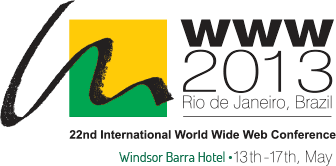The objective of this workshop is to bridge the advances in the Web research community with the practical needs of disaster response professionals, delivering the next generation of Web-enabled disaster management systems. Advances in social media together with the adoption of mobile devices are transforming how we experience and share news. Citizens, volunteers and relief organizations are increasingly relying on social Web to report and act upon large-scale events, as witnessed in the extensive Twitter and other Social Media coverage of the 2010-2012 Arab Spring uprisings and Tohoku Earthquake and Tsunami in Japan in 2011.
This shift towards community-driven news poses a number of challenges:
a) Existing systems enable searching for specific information or identifying aggregate trends in social Web data, rather than providing narratives. How can we derive actionable insights from Social Web to support decision making process, enabling disaster management professionals to act upon and coordinate their response?
b) With an increasing amount of user-generated content, verification becomes an important issue. What practical credibility models can be augmented in social Web, to facilitate content authentication?
c) Only a small subset of Social Web data is geo-tagged. How can we locate the content sources, based on inferencing techniques that are applied to data, user profiles and action history?
d) With computationally challenging data and availability of volunteers, crowdsourced data verification and processing becomes an attractive approach. Yet existing solutions fall short in enabling dedicated crowds to cope with the torrent of information from social media during mass disasters. How can we build scalable Web-systems, accommodating increasing amount of social Web data, and supporting growing volunteer crowds?
- SWDM: 2nd International Workshop on Social Web for Disaster Management (#SWDM2013)
